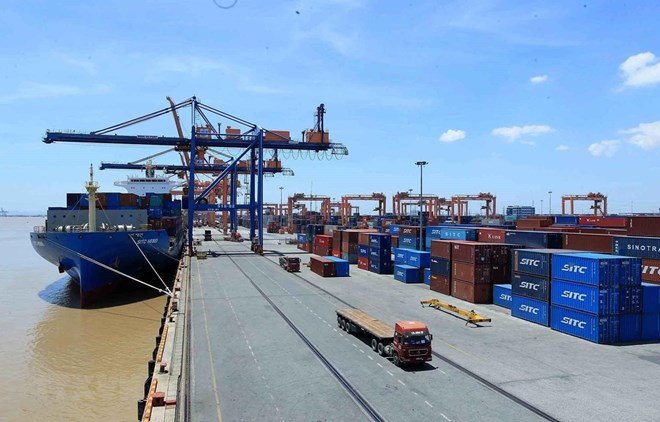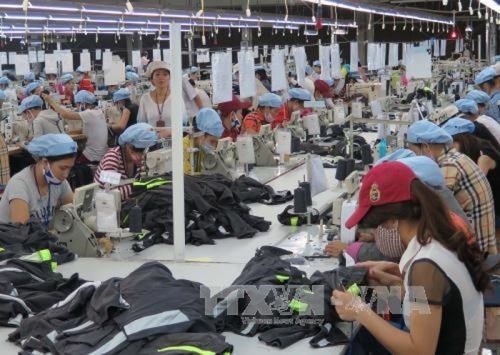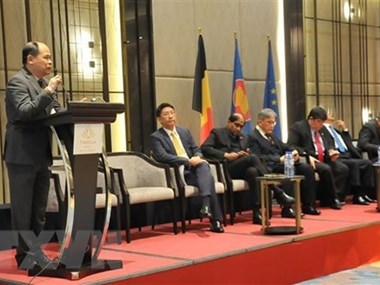 |
|
Thanks to the EVFTA, Vietnamese entrepreneurs will have more chances to get in touch with European counterparts.
|
In an interview granted to the Vietnam News Agency (VNA) following thesigning of the EVFTA and the EU-Vietnam Investment Protection Agreement (EVIPA)on June 30, Thang said that thanks to the EVFTA, Vietnamese entrepreneurs willhave more chances to get in touch with European counterparts.
“If we can bring the EU’s goods and high technologies to Vietnam, thecompetitiveness of Vietnamese commodities, enterprises and the nation will be improved,”he said.
For the EVFTA, Vietnam has had many expectations as the European marketaccounts for one-fourth of its export turnover, he said, adding that anyproducts that are allowed to be exported to the EU can be sold at any placesaround the world.
To boost the country’s exports to the European market, Thang advisedVietnamese enterprises to improve themselves to overcome the market’s stricttechnical barriers.
 |
|
Vietnamese enterprises should improve themselves to overcome the market’s strict technical barriers.
|
He suggested local firms change their quality management and assessmentsystems, and focus on ensuring the enforcement of regulations related to foodsafety and hygiene, environmental protection, ozone layer protection and wildanimal protection, among others.
Thang went on to say that as Vietnam is in the process of development,it needs much investment in infrastructure and hi-tech industry. Meanwhile, theEU has much capital and therefore, when the EVFTA and EVIPA become effective,more flows of capital from the EU will be poured into Vietnam.
However, to that end, Vietnam has to make thorough preparations in termsof basic infrastructure such as electricity, water, industrial zones and humanresources to welcome European investors, he added.
Government to facilitate businesses’ access to EVFTA: Minister
The government will create favourable conditions for businesses to access opportunities created by the EU-Vietnam FTA, Minister of Industry and Trade Tran Tuan Anh said at a press conference after the signing of the EVFTA.
The minister co-chaired the international press conference with European Commissioner for Trade Cecilia Malmstrom after the signing ceremony for the EVFTA and the EU-Vietnam Investment Protection Agreement (EVIPA) on June 30.
He urged domestic businesses to proactively study the content of the agreements and the Government’s plan of action to implement the deals.
The minister said once the EVFTA takes effect, it will create a strong impetus for growth in exports and GDP of the sides. He forecast that bilateral trade could surge by 20 percent right in the first years after the deal comes into force.
The agreement will also create an important foundation for Vietnam to restructure its economy, enhance competitiveness and deliver its integration commitments.
He added that besides the EVFTA, the CPTPP that took effect in Vietnam in January this year and other agreements to be signed in the future will also bring more benefits to Vietnam.
The European Commissioner for Trade said in order for businesses to optimize opportunities brought by the EVFTA, it is important to reduce bureaucracy and support small and medium-sized enterprises.
EVFTA offers huge opportunities for seafood sector to reach out
Aquatic products are subject to a lot of incentives in the European Union – Vietnam Free Trade Agreement (EVFTA), according to experts.
Up to 90 percent of the tariff lines levied on this product type will be cut down to zero percent once the EVFTA is signed, excluding canned tuna and fish ball, with the longest roadmap of seven years.
Experts said this is an excellent chance for the seafood sector to reach out to more markets.
Secretary General of the Vietnam Association of Seafood Exporters and Producers (VASEP) Truong Dinh Hoe said the average import tariff on aquatic products exported to the EU is 14 percent, many of which are imposed with higher tariffs, up to 26 percent.
When the EVFTA takes effect, nearly 840 basic tariff lines, making up about 50 percent of the tariff lines for aquatic products, will be reduced to zero percent; the remaining are subject to 3-to-7-year reduction roadmap.
The EU will provide tariff quota for some Vietnamese special products such as canned tuna, 11,500 tonnes, and surimi, 500 tonnes.
The enforcement of the EVFTA will push Vietnam’s aquatic product exports to the EU market, Hoe said.
He added that shrimp exports will be more optimistic because the tariff lines for this product will reduce sharply from the first year of the deal’s enforcement, then gradually go down to zero percent in the next following years.
Vietnam is now the second biggest shrimp exporter, accounting for 14 percent of the global market share after India.
When the EVFTA and the Comprehensive and Progressive Agreement for Trans-Pacific Partnership (CPTPP) come into effect, the import duties on raw shrimp material from Vietnam and the export duties on processed shrimp in the EU and CPTPP countries will be cut down.
Meanwhile, India is not a member of the CPTPP and the negotiation of a FTA between India and the EU is temporarily delayed.
This is considered a good opportunity for the Vietnamese shrimp industry to compete with India.
According to the VASEP, with the aim of exporting 4.2 billion USD worth of shrimp in 2019, the US is defined as the key growth market of Vietnam with the export turnover projected at 750 million USD, up 17.6 percent against 2018.
The European demand for shrimp is forecast to continuously grow, especially in the UK and the Netherlands.
This is the foundation for the shrimp sector to realise its goal of increasing its export value to the EU to 1.5 billion USD in 2019.
Experts said the signing of the EVFTA is a good chance for aquatic firms to expand export markets and increase their competitiveness.
EVFTA to benefit Vietnamese exporters: official
The EU-Vietnam Free Trade Agreement (EVFTA), which was freshly signed in Hanoi on June 30, is expected to bring about many opportunities for Vietnamese enterprises, especially those involved in exporting major products like seafood, apparels, footwear, and farm produce.
According to Ha Duy Tung, Vice Director of the Ministry of Finance’s International Cooperation Department, right after the deal takes effect Vietnam will eliminate 48.5 percent of tariff lines, equivalent to 64.5 percent of import revenue from the EU.
After 10 years, 99 percent of the tariff lines will be abolished, or 99.8 percent of the import revenue from the EU.
Regarding commitments on export tariffs, Vietnam pledges to erase tariffs on goods exported to the EU in a 15-year roadmap. Export tariff commitments contained in the EVFTA are basically similar to those that Vietnam has made in the Comprehensive and Progressive Agreement for Trans-Pacific Partnership (CPTPP), he said.
Tung noted that the EVFTA also includes commitments on customs, aiming to simplify customs procedures and create favourable conditions for import-export activities through strengthening the exchange of information related to customs requirements, modernizing and simplifying customs procedures, and ensuring transparency of all customs requirements.
At the same time, commitments that Vietnam has made in the EFVTA in financial services, including insurance and securities services, are equivalent to those the country has made to the World Trade Organisation and other FTAs it has signed, said Tung.
He noted that the EU is currently the fourth largest trade partner of Vietnam after China, the Republic of Korea, and the US. The EU is also the second biggest market of Vietnam with 2018 revenue reaching 41.99 billion USD, up 9.5 percent year on year.
Once the EVFTA becomes effective, the EU will remove about 85.6 percent of tariff lines on Vietnamese goods, or 70.3 percent of Vietnam’s export revenue to the EU. After seven years, the lifted tariffs will be 99.2 percent, or 99.7 percent of Vietnam’s export turnover.
Particularly, tropical agricultural products, which are strengths of Vietnam, are not subject to the EU’s huge protection. Therefore, Vietnam will enjoy chances to increase the export of these products to the market.
On the other hand, many domestic sectors will face fiercer competition pressures, including automobile, pharmaceuticals, and breeding, Tung said.
Vietnam’s aquatic products, though enjoying lower import tariffs, will have to meet the EU’s requirements on food safety, he added.
EVFTA opens door for businesses to join global value chains
The conclusion of the EU – Vietnam Free Trade Agreement (EVFTA) marked the end of an arduous journey with three years of negotiations and another three years for preparation to reach the signing, according to Chairman of the Vietnam Chamber of Commerce and Industry (VCCI) Vu Tien Loc.
In an interview granted to the Vietnam News Agency (VNA), Loc said overcoming various difficulties such as internal fluctuations in the EU, including the UK’s exit from the union (Brexit), and some voice of protest, Vietnam and the EU have reached agreement to give birth to the deal, bringing win-win benefits, especially in the context of the complicated global economic developments and the escalating trade tensions between China and the US.
He described the signing of the EVFTA on June 30 as a steady anchor for the cooperative relations between Vietnam and EU members.
The pact brings good chances for Vietnam to access the EU market with over 500 million high-income people, he said, adding that the EU is already the largest export market of Vietnam apart from Asia, making up over 20 percent of the export turnover of Vietnam.
According to Loc, Vietnam and the EU are two supplementary economies without direct competition. Therefore, the completion of the bilateral free trade agreement will open up numerous cooperation opportunities.
The EU is home to the world’s leading economies with numerous global corporations and groups, so Vietnam could enhance trade and investment cooperation between domestic businesses and foreign partners, thus enabling them to participate in global value chains.
Vietnam will also have opportunities to boost exports and attract high quality and environmentally friendly investment flows, Loc said.
He added that the pressure will be heavy but the opportunities will be enormous.
The business leader urged the Government to push ahead with reforms to facilitate business development. The Ministry of Industry and Trade, the Ministry of Planning and Investment and the VCCI should get ready to disseminate information on the trade pact among business associations and enterprises as well as support them in the global integration process.
Businesses themselves should increase competitiveness and promote innovation towards sustainable development, he said.
The VCCI chairman forecast that the EVFTA could help double Vietnam’s exports to EU countries, explaining that European firms want to invest in Vietnam to manufacture products for export back to Europe or other markets.
EVFTA, EVIPA to help raise Vietnam’s position: expert
The EU-Vietnam Free Trade Agreement (EVFTA) and the EU-Vietnam Investment Protection Agreement (EVIPA), which are set to be signed in Hanoi on June 30, will help to improve Vietnam’s position in the global economy, an expert from the Australian National University (ANU) has said.
According to Chu Hoang Long, a senior lecturer in the Crawford School of Public Policy at the Australian National University (ANU), the trade and investment deals are the most comprehensive agreements concluded between the EU and a middle-income country.
By signing the agreements with the EU, Vietnam is on par with its major partners of the EU in Asia such as Japan and the Republic of Korea.
The EU highly valued the signing of the two agreements, considering it an important step to reach a deal with ASEAN in the future, Long said, adding that the EU had signed a trade pact with Singapore in ASEAN.
Under the agreements, EU exporters and investors will get preferential treatment in Vietnam as those from countries participating in Comprehensive and Progressive Agreement for Trans-Pacific Partnership (CPTPP), which Vietnam joined, do.
The signing of the agreements shows that Vietnam is committed to implementing the world’s high standards in trade and investment activities, manpower use, the environment, and sustainable development, Long stressed.
Implementing these commitments will help Vietnam build the image of a dynamic and civilized nation with respect for law and common values, he noted.
The agreements will help increase the competitiveness of Vietnamese goods in the EU market - the second largest importer of Vietnam in 2018; and promote Vietnam’s deeper integration into the global economy, thus taking advantage of EU technology and innovation to diversify its economy and improve its competitiveness.
However, Long pointed out challenges facing Vietnam, saying that domestic producers will have to compete with products imported from the EU, and Vietnam needs to make legal changes to implement its commitments related to services, intellectual property, origin of goods, the rights of labourers and environmental protection.
EVFTA hoped to boost Vietnam’s exports: minister
The EU-Vietnam Free Trade Agreement (EVFTA) is hoped to provide a springboard for Vietnam to boost exports, and diversify export markets and products, especially agri-aquatic ones, according to Minister of Industry and Trade Tran Tuan Anh.
The minister said that the EVFTA is a comprehensive, high-quality deal which has had balanced interest and taken into consideration differences in development levels between the two sides.
According to Anh, negotiations for the EVFTA and the EU-Vietnam Investment Protection Agreement (EVIPA) were launched and concluded amidst the sound Vietnam-EU partnership, especially in economy and trade.
Commitments included in the EVIPA will contribute to building a transparent legal and investment environment, thus helping Vietnam attract more investors from the EU and other markets.
The negotiations and implementation of the agreements conveyed a positive message on Vietnam’s determination in promoting its intensive integration into the world economy, said the minister.
Alongside, Vietnam’s major products will enjoy preferential tax rates as well as favourable conditions for trade activities, he said, adding that farm produce, rice, coffee, bee honey, livestock and fruit will benefit most from the deal.
Minister Anh held that products with high prospects in the EU market include apparels, footwear, wooden furniture, IT and industrial products.
If the EVFTA takes effect in 2020, Vietnam’s export to the EU will increase 20 percent and is predicted to reach 70-80 percent in 2025-2030, giving a boost to GDP. At the same time, it will put domestic sectors in a fiercer competition, prompting them to restructure and enhance capacity.
This is a chance for Vietnam to further develop and form a common value chain with partners, thus enhancing the investment efficiency for economic sectors, asserted the minister.
He noted that the EU is the leading trade and investment partner of Vietnam.
The EU’s strong sectors such as services, finance, automobile, processing and manufacturing, IT, high technology, agriculture and food processing are the areas that Vietnam needs investment for comprehensive development, said Anh.
He said that the conclusion of negotiations is the prerequisite, but the readiness of enterprises which will be directly impacted by the deal is more important.
Businesses should be more proactive in accessing resources, particularly, small-and-medium-sized enterprises, should make comprehensive preparations and careful research of opportunities and challenges, thus rolling out responding solutions to improving their products’ quality, competitiveness, and productivity.
He also stressed that businesses should ensure that their products meet requirements on traceability, technical standards, as well as plant and animal safety and hygiene criteria of the EU.

EVFTA to create new opportunities for Vietnam: official
Once the EU-Vietnam Free Trade Agreement (EVFTA) takes effect, over 99 percent of tariff on goods from both sides will be lifted, a Vietnamese official has said.

EVFTA and CPTPP expected to help Japan become Vietnam’s No.1 investor again
Japanese companies with abundant expertise in many fields such as banking, insurance, construction, logistics, accounting, graphic design, among others, are expected to have greater opportunities in Vietnam’s market.
 The European Union-Vietnam Free Trade Agreement will help increase the competitiveness of Vietnam as well local enterprises and commodities, said Pham Tat Thang, a senior researcher at the Vietnam Trade Research Institute.
The European Union-Vietnam Free Trade Agreement will help increase the competitiveness of Vietnam as well local enterprises and commodities, said Pham Tat Thang, a senior researcher at the Vietnam Trade Research Institute.